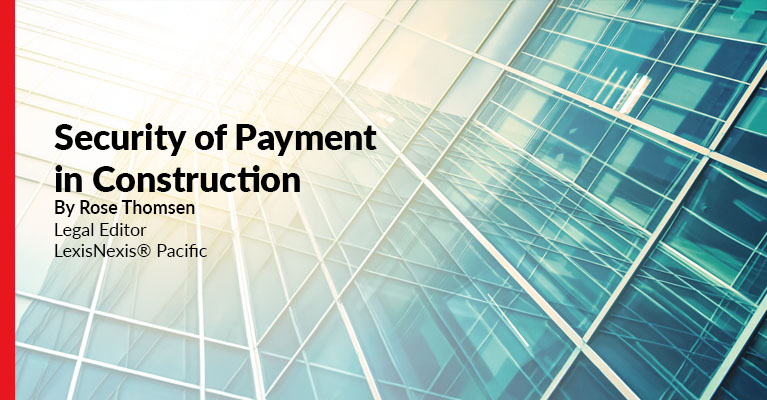Australia’s merger clearance process is undergoing significant reform, driven by longstanding concerns the current voluntary, informal regime does not sufficiently prevent anticompetitive mergers. After...
* The views expressed in externally authored materials linked or published on this site do not necessarily reflect the views of LexisNexis ® Legal & Professional. As AI is poised to transform workplaces...
* The views expressed in externally authored materials linked or published on this site do not necessarily reflect the views of LexisNexis ® Legal & Professional. Corporate legal departments are under...
Authored by Shaun Burmester, Legal Writer, Property, Practical Guidance One of the most significant overhauls in Queensland property law in over 50 years is set to take effect on 1 August 2025. The...
Authored by: By Sharon Givoni, General Editor of the Privacy Law Bulletin, Principal Lawyer, Sharon Givoni Consulting and Alec Christie, Partner, Head of Privacy Risk and Digital Law, Atmos Legal Australia...

Over the last decade, security of payment legislation has been introduced in all Australian jurisdictions as follows:
NSW: The Building and Construction Industry Security of Payment Act 1999
VIC: The Building and Construction Industry Security of Payment Act 2002
WA: The Construction Contracts Act 2004
NT: Construction Contracts (Security of Payments) Act 2004
SA: The Building and Construction Industry Security of Payment Act 2009 and The Worker’s Liens Act 1893
ACT: Building and Construction Industry (Security of Payment) Act 2009
TAS: Building & Construction Industry Security of Payment Act 2009
QLD: Building Industry Fairness (Security of Payment) Act 2017
The purpose of the legislation is to provide a fast statutory scheme for resolving payment disputes and allowing contractors and sub-contractors to be paid for completed work.
Harmonisation
Two models of adjudication exist across Australia, with NSW, Victoria and Queensland following the ‘East Coast Model’ and Western Australia and the Northern Territory following the ‘West Coast Model’.
Whilst similar protections exist across the various schemes in each state and territory, differences in operation, process and timeframe requirements cause unnecessary complexity and confusion for parties.
The Review of Security of Payment Laws by John Murray AM was released in 2018 and recommended that security of payment laws be harmonised across Australia. Mr. Murray recommended adoption of the East Coast model but with substantial alteration to achieve a higher degree of flexibility and procedural fairness for parties to construction contracts.
His first recommendation called for increased simplicity:
‘Security of payment legislation should seek to promote prompt payment so as to maintain a contractor’s cash flow. Such an outcome is more effectively achieved through adoption of a legislative regime broadly based on the East Coast Model.’
Various states have begun to implement changes following the review with NSW removing the ‘reference date’ provisions and introducing an entitlement to progress payments for work already performed or undertaken to be performed in contracts entered into from 21 October 2019.
From 3 February 2020, construction contracts in the Northern Territory will afford contractors more rights to ensure they receive fair payment and to make it simper for payment disputes to be resolved quickly.
The Commonwealth is yet to provide a response to the Murray review.
A second review titled Security of Payment Reform in the WA Building and Construction Industry by highly esteemed barrister John Fiocco was released by the Western Australian government in late 2018. This Review strongly supported the first Murray Review recommendation to follow the East Coast model, together with many other Murray Review recommendations.
The Fiocco Review pointed out that, ‘while national harmonisation is an admirable objective, it may be more realistic to aim for greater national consistency, at least in the short term.’1
Following the Fiocco review, the Building and Construction Industry (Security of Payment) Bill 2020 was introduced to parliament in 2020 and is more consistent with the East Coast model. The bill is designed to afford better protection to contractors by introducing more stringent regulations and shorter payment timeframes.
The bill has progressed through the Legislative Assembly and was introduced to the Legislative Council on 11 November 2020. If adopted, the amending legislation will bring us one step closer to a higher degree of national consistency in security of payment laws.
For more information on the issues discussed above read our collection of articles from Australian Construction Law Bulletin or subscribe to our Australian Construction Law bulletin.
Reference dates for payment claims involving draft claim regimes (2020) 31(6&7) ACLB 70 (NSW)
The Murray Review of Security of Payment Laws (2018) 30(1&2) ACLB 114 (All jurisdictions)
Building Contracts Australia also provides a comprehensive discussion of Security of Payment laws in Australia by expert author, Alan Cullen.
1 Fiocco Review at 2, 156.




